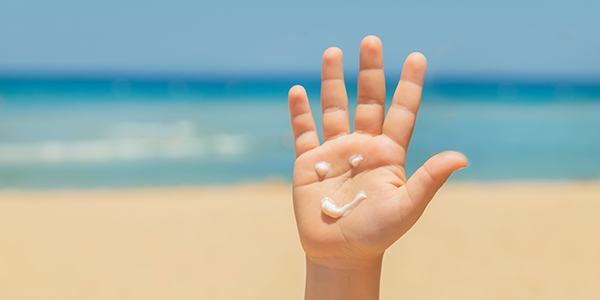3 Lifesaving Tips to Keep Safe in the Sun This Summer

Going out on duty? Better gear up first to beat the heat. It’s nice to have a job that lets you soak up the sun all day, but … let’s just call all that sunshine and fresh open air an “occupational hazard.”
Wear Sunscreen
Here are some common excuses that some lifeguards (not you, of course) use to justify not wearing any sunscreen:
- “It will ruin my tan.”
- “I don’t get burned.”
- “I don’t like the smell.”
- “It’s a waste of time; I’ll be under the umbrella with a T-shirt on, anyway.”
- “All that oil makes my face break out.”
- “I’ll look silly if I don’t get it rubbed in.”
These excuses have one thing in common: none of them are good. In order, here’s why:
- You will still tan if you lay out in the sun, even with a high-SPF sunscreen.
- Ultraviolet (UV) rays can still damage or sunburn your skin, no matter your complexion.
- The smell of sunscreen is glorious. But if you really don’t like it, there are a number of unscented sunscreen options on the market that also work well.
- Umbrellas may bring the heat down a bit, but they don’t stop diffused UV rays. Same for T-shirts, which only have an UPF rating of about 7.
- An oily face, or an increased risk of skin cancer … you choose. Besides, manufacturers make sunscreen products specifically for your face!
- Anyone who says this sounds silly. You know who doesn’t look silly? Vera Wang. She stays out of the sun, and she’s 70.
Anyone who’s taken a nap for just a little too long in a pool chair will tell you that sunscreen is worth it. It’s much less painstaking than the blistering wrath of the fireball in the sky that beats down on you during every minute of your lifeguarding duties.
So how do you decide which sunscreen is right for your skin? Here are some basics:
- A higher SPF reduces the number of UV rays that reach the skin. For example, SPF 15 blocks 14/15 UV rays, while SPF 30 blocks 29/30 UV rays.
- Broad-spectrum sunscreens are more likely to block both UVA and UVB rays. While UVA rays age skin cells, UVB rays are the ones that burn you. Both cause skin cancers like squamous cell carcinoma and melanoma.
Wear Sunglasses
Some people might feel the need for sunglasses more than others (lighter eye colors are often more sensitive to light), but trust me — you need them. Like sunscreen, sunglasses protect your eyes from UV radiation, but they also reduce the effects of high-energy visible (HEV) light.
If you don’t know what HEV light is, it’s kind of the reason that so many people use blue-light filters on their laptops and reading glasses. The light spectrum is full of long and short wavelengths that make up the colors of the rainbow. Red lights have long wavelengths and are safer. Blue and violet lights have shorter wavelengths, have more energy, and are more likely to cause damage to your eyes. Talk about being blinded by science!
Lifeguarding will be a lot harder if you don’t protect your eyes, even on a daily basis. Think about how much more difficult it would be to perform a rescue if you had trouble seeing any distress (if at all). Here’s how you can take care of that:
- Choose gray or green lenses for optimal lifeguarding vision. Gray lenses maintain a more natural look that doesn’t distort colors. Green lenses reduce bright lights and even reduce some blue light.
- If you can, consider purchasing a pair of polarized lenses. These sunglasses have a special film on them that reduce glare reflected off water. This makes polarized lenses a top pick among lifeguards because they make it easier for you to scan below the water’s surface.
Hydrate!
Even if you keep the sun off you, the heat is sure to keep your body’s natural cooling systems working overtime. Be sure to drink at least 8 ounces of water every hour. And if you still feel dehydrated, the electrolytes in sports drinks could help replenish the bodily minerals that you lose while sweating.
—
Lifeguarding can be a fun and rewarding experience, as long as that experience isn’t filled with sunburnt skin and sunblind eyes. By keeping yourself safe, you make it easier to do your duty and keep your pool’s patrons safe, too!
